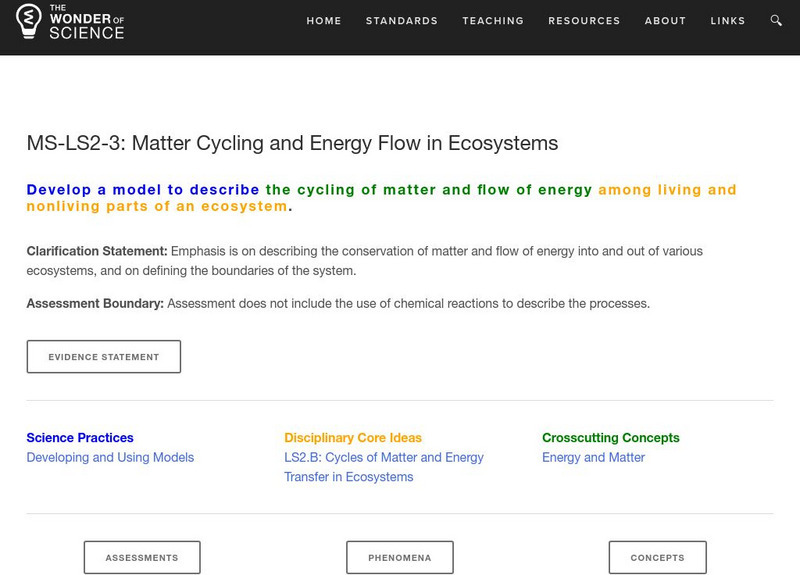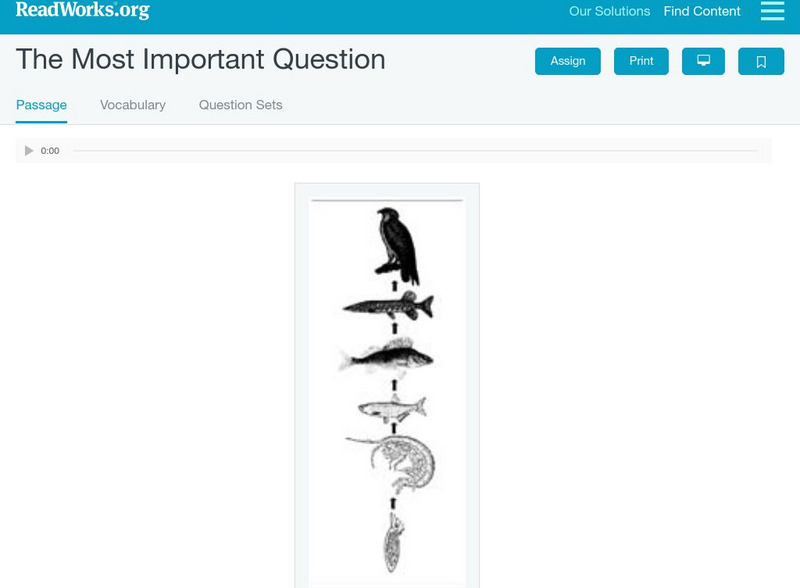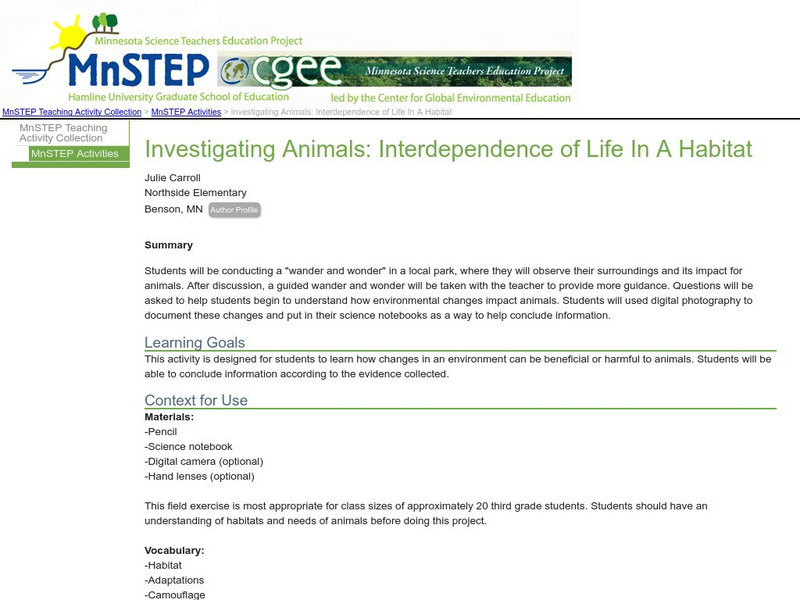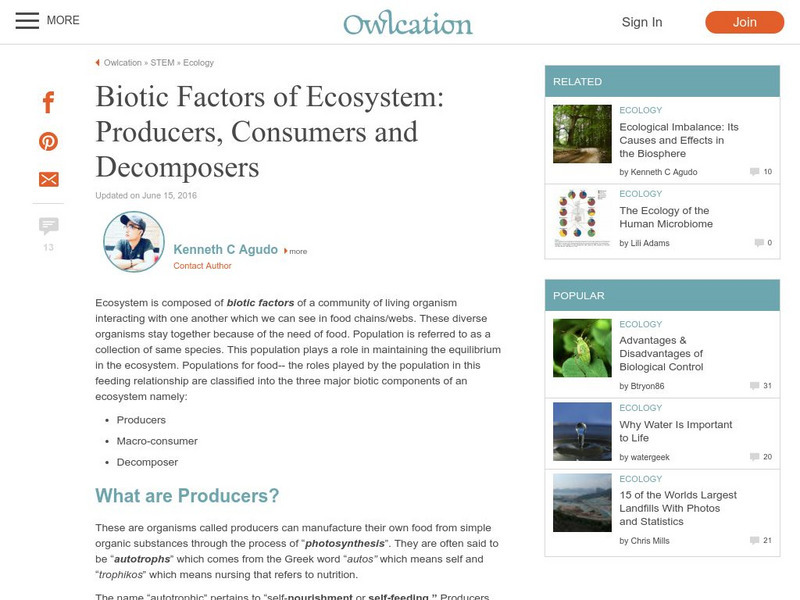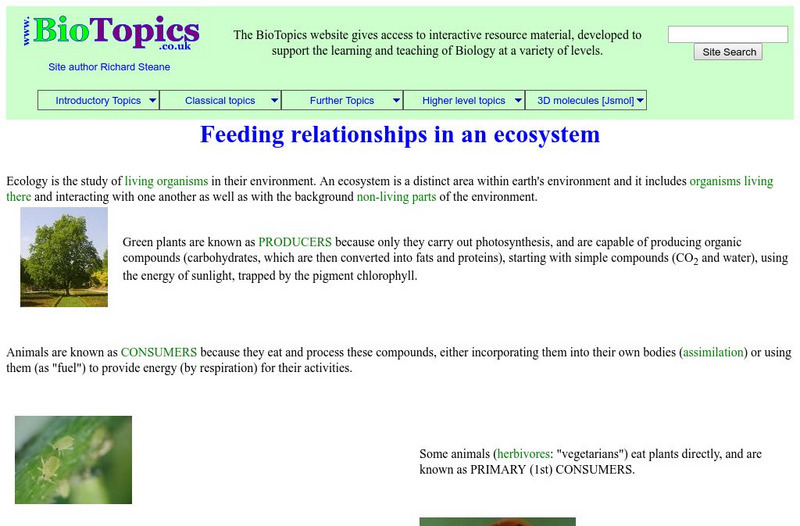Shmoop University
Shmoop: Ecosystem Energy Flow
Explains the processes by which energy flows through an ecosystem. Covers the meanings of key vocabulary, e.g., types of producers and consumers, trophic levels, food webs, and the energy pyramid.
Mocomi & Anibrain Digital Technologies
Mocomi: What Is an Ecosystem?
Learn about ecosystems, how they work, codependency, and food chains.
CK-12 Foundation
Ck 12: Episd: Energy Pyramids
[Free Registration/Login may be required to access all resource tools.] Understand how energy flows within ecosystems through the use of energy pyramids.
CK-12 Foundation
Ck 12: Episd: Consumers and Decomposers
[Free Registration/Login may be required to access all resource tools.] Based upon the way organisms acquire their energy students will understand how to group them as consumers, decomposers or producers.
Other
Kidwings: Virtual Owl Pellet Dissection
A complete lesson on owl pellets. Students can read information, watch a tutorial, and use their computer mouse to complete a dissection simulation right there on the screen.
Georgia Department of Education
Ga Virtual Learning: Ecosystems
This module offers an in depth study of the fundamental components of ecosystems. Activities include mini-lessons with videos and student assignments.
Tramline
Virtual Field Trip: Temperate Forest Biome
Travel with your students on a Virtual Field Trip to learn about Temperate Forest Biomes. You will also discover many informative and interactive websites.
Annenberg Foundation
Annenberg Learner: The Habitable Planet: Ecosystems: Energy Flow Through
Detailed explanation of the processes by which energy flows through an ecosystem. Scroll down and open Section 3.
Massachusetts Institute of Technology
Mit: Open Course Ware: Courses: Civil Environmental: Ecology I: The Earth System
College-level online course highlighting the fundamentals of ecology. Course topics include coevolution of the biosphere, geosphere, atmosphere, and hydrosphere; photosynthesis and respiration; and the carbon, nitrogen, and water cycles....
CK-12 Foundation
Ck 12: Earth Science: Flow of Energy in Ecosystems
[Free Registration/Login may be required to access all resource tools.] Describes how energy is transfered from one organism to another.
The Wonder of Science
The Wonder of Science: Ms Ls2 3: Matter Cycling and Energy Flow in Ecosystems
Work samples, phenomena, assessment templates, and videos that directly address standard MS-LS2-3: matter cycling and energy flow in ecosystems.
Read Works
Read Works: The Most Important Question
[Free Registration/Login Required] A literary text about some animals who have to learn to share their space around the pond. A question sheet is available to help students build skills in reading comprehension.
Bill Nye
Bill Nye: Planaria Fishing
In this tutorial, Bill Nye explains how to catch planeria, small carnivorous worms that live in ponds. In addition, he explains their role in the environment.
CK-12 Foundation
Ck 12: Life Science: Producers
[Free Registration/Login may be required to access all resource tools.] Energy is the ability to do work. In organisms, this can be physical work, like walking or jumping, or it can be the work used to carry out the chemical processes in...
National Center for Ecological Analysis and Synthesis, University of California Santa Barbara
Kids Do Ecology: Learn About Ecology
This resource provides information about ecology.
E-learning for Kids
E Learning for Kids: Science: South Africa: How Do Organisms Get Their Energy?
Join Ellen on her trip to the Kaap De Goede Hoop in South Africa, and learn more about plants, animals, and energy.
Science Education Resource Center at Carleton College
Serc: Investigating Animals: Interdependence of Life in a Habitat
In this activity, students will learn how changes in nature can be beneficial or harmful to animals. At the end, students will be able to conclude information according to the evidence collected.
Bio Topics
Bio Topics: Ecological Pyramids
A colorful tutorial about ecological pyramids. Read the information, and then check your understanding with some questions and answers about the topic.
CK-12 Foundation
Ck 12: Life Science: Flow of Energy
[Free Registration/Login may be required to access all resource tools.] When an herbivore eats a plant, the energy in the plant tissues is used by the herbivore. Every time energy is transferred from one organism to another, there is a...
National Institute of Educational Technologies and Teacher Training (Spain)
Ministerio De Educacion: La Dinamica De Los Ecosistemas
This unit shows how ecosystems change over time and how matter and energy, which are essential to its operation, are transformed and passed from one living thing to another forming, in some cases, authentic cycles. It contains 19...
Other
Hub Pages: Biotic Factors of Ecosystem: Producers, Consumers and Decomposers
An ecosystem is composed of biotic factors of a community of living organisms interacting with one another which we can see in food chains/webs. These diverse organisms stay together because of the need of food. Population is referred to...
Curated OER
National Park Service: Moon Crater Ecosystems Lesson Plan
This is a teacher's guide to a lesson on ecosystems. The objective is for the students to set up their own ecosystem and define the roles of producers, consumers and scavengers.
Georgia Department of Education
Ga Virtual Learning: Biology: Ecology I
A comprehensive ecology learning module where students assess the dependence of all organisms on one another and the flow of energy and matter within their ecosystems.
Bio Topics
Bio Topics: Feeding Relationships in an Ecosystem
This overview of feeding relationships illustrates to students the trophic levels of different organisms in an ecosystem. Hover the mouse over different terms to see their definitions.
Other popular searches
- Food Webs and Chains
- Ecology Food Webs Chains
- Food Webs and Food Chains
- Ocean Food Chains and Webs
- Food Webs Chains
- Food Webs Food Chains
- Food Webs, Food Chain











